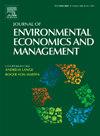The impact of air pollution on mental health: Evidence from Texas
IF 5.9
3区 经济学
Q1 BUSINESS
Journal of Environmental Economics and Management
Pub Date : 2025-06-25
DOI:10.1016/j.jeem.2025.103198
引用次数: 0
Abstract
I estimate the impact of air pollution on mental health employing a comprehensive population-level outpatient diagnosis dataset and a quasi-experimental design. This study uses wind direction as an instrumental variable (IV) to address endogeneity concerns associated with exposure to fine particulate matter (PM2.5), ensuring a robust analysis of mental health outcomes. The results indicate that a 1 increase in PM2.5 concentration leads to a significant increase in principal diagnoses for mental health illness in general, and specifically depression, anxiety, and stress, by 9.6, 5.3, 2.6, and 1.7 cases per 100,000 individuals, respectively. In addition, the study highlights sex-specific effects, with women more susceptible to stress and men more affected by anxiety. The findings suggest that principal diagnoses are particularly sensitive to increases in PM2.5 exposure. These results provide valuable insights for the development of public health strategies addressing the environmental determinants of mental health, particularly as air pollution levels continue to rise. In conclusion, this study presents strong empirical evidence linking PM2.5 exposure to increased mental health diagnoses, underscoring the need to consider mental health when designing policies to address air pollution.
空气污染对心理健康的影响:来自德克萨斯州的证据
我估计空气污染对心理健康的影响采用全面的人口水平门诊诊断数据集和准实验设计。本研究使用风向作为工具变量(IV)来解决与细颗粒物(PM2.5)暴露相关的内生性问题,确保对精神健康结果进行强有力的分析。结果表明,PM2.5浓度每增加1 μg/m3,一般心理健康疾病,特别是抑郁症、焦虑和压力的主要诊断分别增加9.6例、5.3例、2.6例和1.7例/ 10万人。此外,该研究还强调了性别差异的影响,女性更容易受到压力的影响,而男性更容易受到焦虑的影响。研究结果表明,主要诊断对PM2.5暴露量的增加特别敏感。这些结果为制定解决心理健康的环境决定因素的公共卫生战略提供了宝贵的见解,特别是在空气污染水平持续上升的情况下。总之,本研究提供了强有力的经验证据,证明PM2.5暴露与心理健康诊断的增加有关,强调了在制定解决空气污染的政策时考虑心理健康的必要性。
本文章由计算机程序翻译,如有差异,请以英文原文为准。
求助全文
约1分钟内获得全文
求助全文
来源期刊
CiteScore
8.00
自引率
4.30%
发文量
91
期刊介绍:
The Journal of Environmental Economics and Management publishes theoretical and empirical papers devoted to specific natural resources and environmental issues. For consideration, papers should (1) contain a substantial element embodying the linkage between economic systems and environmental and natural resources systems or (2) be of substantial importance in understanding the management and/or social control of the economy in its relations with the natural environment. Although the general orientation of the journal is toward economics, interdisciplinary papers by researchers in other fields of interest to resource and environmental economists will be welcomed.

 求助内容:
求助内容: 应助结果提醒方式:
应助结果提醒方式:


